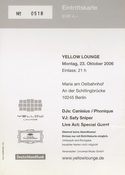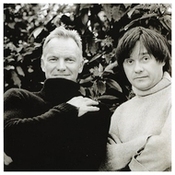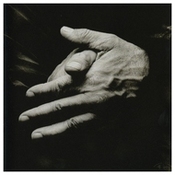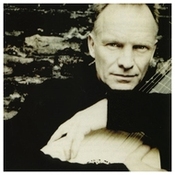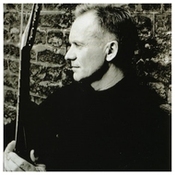
Songs From The Labyrinth
Secret private concert in a trendy club - singer Sting inspires...
The Ave Maria is playing. A babble of voices. Couples cuddling. Bells ringing. Images of blue skies with fluffy clouds flicker across screens and projectors. Bottled beer, red wine, and long drinks are being sold over the bar. Boys with flat caps and tattoos on their upper arms, girls with backpacks and sneakers. It smells earthy, kind of mossy.
It's a completely normal Monday evening at the "Maria" at Ostbahnhof, you'd think. With a huge line in front of the entrance, stretching halfway across Schillingbrücke. Waiting for entry to Universal's Yellow Lounge, organized by Anne-Maria Knoop. Two security checks are passed.
About 100 people with tickets in their hands, still unaware of what surprise awaits them. They—unlike the invited guests from the music scene like Thomas Quasthoff—have bought tickets for four euros for an evening with DJs Canisius and Phonique. They have no idea that they're about to hear a nearly two-hour concert with Sting. They only see that the security checks are more manned today. This is Berlin. This is simply amazing. A record company is secretly inviting them to a club night with a superstar. In a cool location, right by the water, Sting sits in a T-shirt on a cushioned chair, singing—almost a cappella—with his eyes closed his new classical songs from the album 'Songs from the Labyrinth,' featuring compositions by the English composer John Dowland. He quietly comments on the initial thunderous applause: "Please don't clap. It's nicer when it's quiet. It's a great honour for me to be here."
You can hear a pin drop. The bar stops operating. Everyone here also adheres to the smoking ban, to protect their golden throats. Sting – within reach.
He jokes about his partner Edin Karamazov, the Queen, counts the beat in German, sprays moisturizer in his mouth and under his armpits. The muscles in his upper arms swell when he plucks the strings of his lute. He sings of love and bliss, wishing the audience God's blessing. His legendary "Message in the Bottle" from his time with his band "Police" will be played as an encore at midnight. We are inspired.
(c) Die Welt by Franziska v. Mutius
ting made us forget place and time...
When we saw the venue for the first time, each one of us fans (Giovanni, Lydia, Stepanka, Anja, Anne, Marlene, Isabel, Rüdiger, Gitte, and me) was rather taken aback: a concrete box with a neon sign to declare it MARIA, heavily graffitied and shabby, sitting in a dusty, littered, overgrown lot on the bank of the river Spree, next to big, bright, new or impressively refurbished buildings. Very Berlin (that's why the Berliners thought nothing of it). But how could this raw party place be right for, no, not a Police revival, but Dowland's fine tunes?
It was an anxious wait for us to get inside: we watched numerous ''VIPs'' (?) walk into the building for an hour before security let us in an hour before the start. But fortunately our fear to be stuck in the back was quickly dispelled, as many of the VIPs and Universal people were lounging about the bar, so we moved close to the little stage, some of us sitting on cushions or the floor, some of us standing to the side. By ten, the place had filled considerably, but we were well positioned. Everyone was tuned in to classical music by flowing DJ/VJ clips on two big screens at the back of the stage.
Then the lutes were brought onstage (the labyrinth one, too), the clips stopped and Sting and Edin unceremoniously began the show.
Sting told the story, cracked some jokes, read from Dowland's letter, like in London. Stile Antico supported him, like in London. And he sang, and played the lute - not quite sure if like in London. Since I have only the radio broadcast and my friends' impressions for comparison, I can say this: e.g. Anja felt that the nervousness of London had dissolved into a much more confident radiance, Anne said his voice had gotten even better suited to the material. To me he seemed a bit hesitant at first (like on the CD recording), but then warmed to the situation and was in command, so that especially for the bright 'Clear or cloudy', for 'Come again' and the haunting 'In darkness let me dwell' with its ''jarring sounds'' he used his voice very expressively. Even when he "lost the thread", as we say in German, to Edin's very fast tempo in the first lute duet, he was cool enough to mention it afterwards and turn it into a positive little joke ("I played the difficult part") that was taken up later by Edin after 'La Rossignol' went beautifully and smoothly ("Now in this piece both parts are easy'' to which Sting said, ''Don't tell them that! I've practised this for a year!").
I was very moved to not only hear, but also see them play together, because you could see the concentration and focus, the depth to which the music can take you. Edin's virtuosity, energy and quiet ease was admirable to watch. And although none of us listeners will have an Edin to teach and support us, this experience was like Sting offering us a glimpse into what music can be, encouraging us to be open to things unheard.
It was a similar set list as in London, down to the encores,.e.g. no Wilt thou unkind thus reave me, but 'La Rossignol' in full (my favourite of the lute pieces). Sting dedicated 'Message in the Bottle' to his "good friend Stewart who is in the audience tonight". With the second reprise he got Stile Antico onto the stage again so they could also reap their well-deserved applause: 'Fine Knacks for Ladies' one more time, and this time Sting delivered it with such fervour and fun that it sounded like one of his own songs.
Thank you to Sting, Edin and Stile Antico for the exceptional evening and to Dave, Wendy and Tina for making it possible for some of us to be there.
(c) Angelika for Sting.com
Message in a Lute...
What are 400 years when it comes to feelings? Pop musician Sting has discovered a kindred spirit in the Elizabethan bard John Dowland. Last night, he presented his interpretations of the ancient chant to a moved Berlin crowd.
It was all just a coincidence. That evening in the early 1980s, when the frontman of the band Police was on stage solo with guitar for Amnesty International in London. The bard's performance forced actor John Bird backstage. Compliments were politely exchanged, but then Sting was asked if he knew John Dowland's music, which Bird was reminded of. But Sting didn't have much more than the name at hand. Since then, John Dowland's music has entered Sting's life at irregular intervals, via circuitous paths.
And because Sting likes to interpret signs, it was almost inevitable that Dowland (1563-1626), as the undead, would eventually find its way into the work of the very lively pop musician. After a chain of coincidences, last night, Sting appeared unannounced on the stage of the small club "Maria am Ostbahnhof" in Berlin's trendy Friedrichshain district, to show the world: There are no coincidences.
"We are here to honour John Dowland," he announced a bit too solemnly. But what followed was indeed a mass. Accompanied only on the lute by the Bosnian Edin Karamazov, the Briton took the listeners, who were both astonished and touched, on a journey through time, into a time warp that stretched from Dowland's Elizabethan era 400 years ago directly into the 21st century.
Right from the start, 'Flow My Tears', steeped in cheerful hopelessness, revealed Dowland's range. "Many see him only as a grief-stricken melancholic," says Sting. But he possesses much more: "Sly humour, lightness, and pop appeal." Sting's idea of Dowland extends beyond the mere adaptation of Renaissance songs; in a kind of staged reading, he repeatedly sprinkled in excerpts from letters from his fellow singer, who would have loved to become a court singer to Queen Elizabeth I, but as a Catholic, was forced to tour Europe - as the first British pop star, so to speak. Sting, himself well-equipped in his songs with all the devils and angels of Catholicism, never says it out loud, but nevertheless demonstrates in every note how well he can empathize with what drove his colleague Dowland.
(c) Der Spiegel Markus Deggerich
The string beginner - veteran Sting's Dowland concert in a Berlin venue...
It's certainly never been this silent. Normally, techno DJs rock out at the "Maria am Ostbahnhof" without a care for hearing loss. The Friedrichshain club opposite Berlin's new off-theatre hangout "Radialsystem" has more of the charm of a knacker's shop, packed with a bar and plenty of speakers to serve customers. But all that was forgotten for a contemplative hour, because instead of hardcore techno, there was a tenderly courting "very special guest": Sting appeared late at night on the mini-stage. Not with the usual hits in the usual format, but with lute accompaniment by the great Edin Karamazov and a handful of songs by John Dowland.
Ballads with a Shakespearean flavor, 400-year-old singer-songwriter material – something new for those between 20 and 30 who are unfamiliar with opus numbers. Just the thing for the "Yellow Lounge" evenings with which Deutsche Grammophon (DG) regularly participates in Berlin's club scene, aiming to pique young audiences' interest in old music through short live performances by its own artists. Although Sting isn't the first with this idea; Elvis Costello and British jazz musicians have also tackled Dowland's "Songs or Ayres," alongside expert falsettists like Deller and Scholl. But DG had just received a "Klassik-Echo" award for Sting's "Songs From The Labyrinth" at its annual industry party, and since they'd already had him live, they added a "secret concert" in Berlin. Of course, it wasn't that secret. 700 tickets, four euros each, sold out in a flash after media partner Deutschlandfunk had leaked the ticket right on schedule. To set the mood, video projections flickered on the walls, while the speakers blared the usual classical radio riffs of "Swan Lake" and the "Star Wars" soundtrack. Far up front in the semidarkness, baritone Thomas Quasthoff sat on one of the few cushioned seats. Everyone drank Astra, relaxed in the here and now. The only one who initially struggled with nerves was, of all people, the lead actor. Although Sting had nothing more to do than play his part exactly to the music, it was clear to hear how difficult the seemingly simple Elizabethan catchy tunes were for him. But also how deeply this timelessly touching music touched him.
He took it in stride with a friendly smile that Karamazov, a string beginner on the theorbo, plucked him, a string beginner, against the wall with rapidly improvised solos. At first, however, it took some getting used to the fact that even with Dowland, Sting still sounds like Sting, that he doesn't invent or discover anything new. The man has his fun, and is lucky enough to be able to pack his private pleasures onto a charming record. Between the Dowland classics, however, the former teacher repeatedly shone through: with biographical explanations or meaningfully recited letter quotations accompanied by birdsong from the tape, there were historical tidbits for better understanding. It was rather annoying, but quickly passed.
A Sting performance without Sting songs? Sting himself thought that was completely unacceptable and gave three Dowland-style encores which not only satisfied his own desire to play but also satisfied the expectations of the already enraptured audience: first the ballad 'Fields Of Gold', then, as a credibility detour, Robert Johnson's blues classic 'Hellhound On My Trail' and, last but not least, the good old 'Message In A Bottle'.
(c) Hamburger Abendblatt by Joachim Mischke

